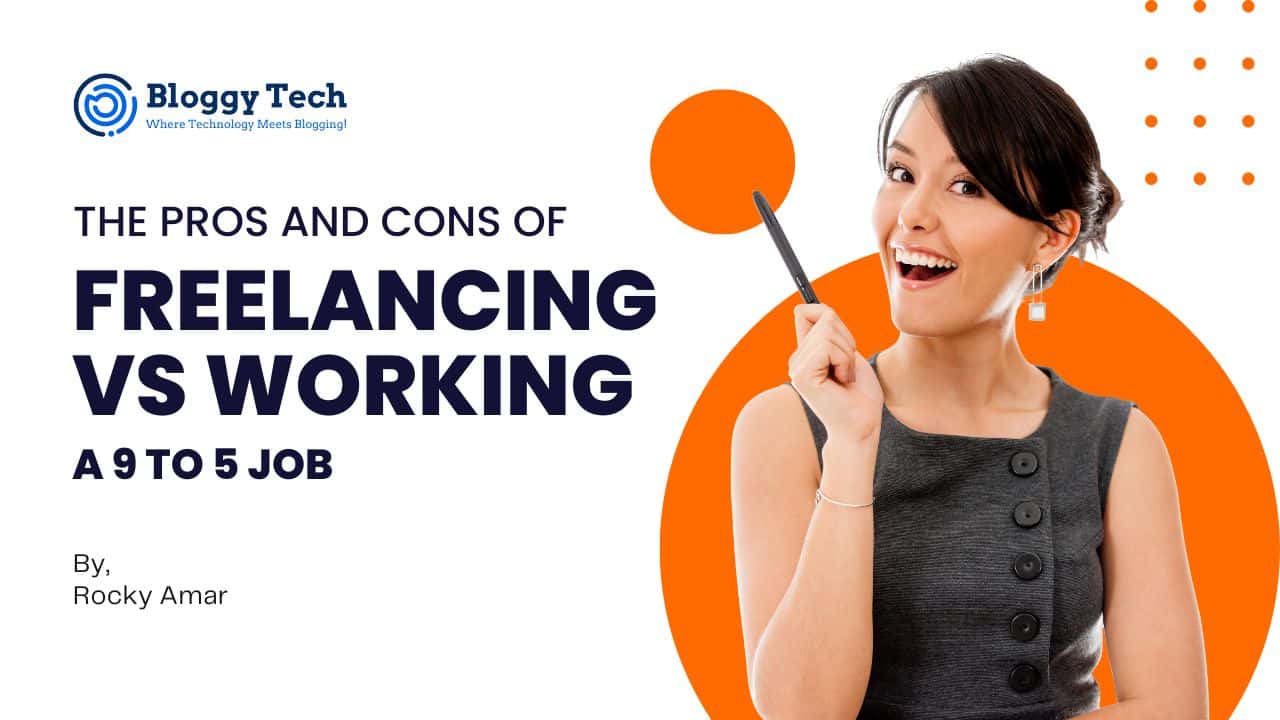Unlock your online potential with UnikBrushes - Your one-stop-shop for expert web development and digital marketing solutions.
Join BloggyTech now and stay ahead in the game with valuable insights and tips on technology, digital marketing, and personal development!
Looking for a list of trendy AI tools that can enhance and save time in your work? Check out ZynoSItes - I'm sure you'll be amazed!
Upgrade your writing game with ZynoInk - the ultimate AI-powered writing tool for students and marketing professionals. Try it now and experience the difference!
Freelancing and working a traditional 9-to-5 job are two distinct career paths that offer different sets of benefits and challenges. Freelancing refers to working independently on a project-by-project basis, while a traditional 9-to-5 job involves working for a single employer on a full-time basis.
Freelancing offers a high level of flexibility, as you have the freedom to set your own schedule and work from wherever you choose. This can be especially appealing for people with young children, elderly family members to care for, or other commitments that make a traditional 9-to-5 job difficult. Freelancers also have complete control over the amount of work they take on, which means they can choose to work as much or as little as they want.
Additionally, freelancing allows you to try out different industries and types of work, which can be a great way to figure out what you enjoy doing and what you’re good at. Finally, freelancers often have the ability to charge higher rates for their work, especially if they have specialized skills or a strong portfolio, which means they have the potential to earn more than they would in a traditional job with a set salary.

On the other hand, freelancing can also be unstable and lacks the benefits and support of a traditional job. Freelancers don’t typically receive the same job security, benefits, or resources as traditional employees, such as health insurance, retirement plans, and paid vacation time. They are also responsible for paying their own taxes, which can be a complex and time-consuming process. And while freelancers have the ability to choose their own projects and clients, they may also face periods of unemployment or low income if they are unable to secure enough work.
Additionally, freelancers may have limited opportunities for advancement, as they are not part of a traditional company hierarchy and may have to work hard to continually find new clients and projects in order to advance their career.
In contrast, working a traditional 9-to-5 job provides a high level of job security, as you have a consistent income and a sense of stability that can be reassuring for some people. Traditional jobs also typically offer a range of benefits, such as health insurance, retirement plans, and paid vacation time, which can be a big advantage for people who need these types of protections.
Additionally, traditional jobs often offer opportunities for advancement, as you may have the opportunity to move up the ladder and take on more responsibility over time. Finally, working a traditional job often means you’ll have access to a range of support and resources, such as training programs, mentorship opportunities, and professional development opportunities.
However, working a traditional 9-to-5 job can also be inflexible and offer limited control over your workload. As an employee, you’ll typically be expected to work set hours, which may not be conducive to your personal schedule or needs. Depending on where you live and work, commuting can also be a major time drain and a source of stress.
And while you may have the opportunity to advance your career in a traditional job, your earning potential may be limited compared to what you could potentially earn as a freelancer. In a traditional job, you’ll usually be paid a set salary, while freelancers have the ability to charge higher rates for their work.
Ultimately, the right choice for you will depend on your individual circumstances, goals, and personality. It’s important to carefully consider the pros and cons of each option before making a decision.
The Pros and Cons of Freelancing vs Working a 9-to-5 Job

Pros of Freelancing:
Flexibility: One of the biggest advantages of freelancing is the flexibility it offers. As a freelancer, you have the freedom to set your own schedule and work from wherever you choose. This can be especially appealing for people with young children, elderly family members to care for, or other commitments that make a traditional 9-to-5 job difficult.
Control over your workload: As a freelancer, you have complete control over the amount of work you take on. This means you can choose to take on as much or as little work as you want, depending on your current commitments and workload.
Ability to try out different industries: Freelancing allows you to try out different industries and types of work, which can be a great way to figure out what you enjoy doing and what you’re good at. This can be especially useful for people who are just starting out in their careers and are still trying to figure out their path.
Potential for higher earnings: Freelancers often have the ability to charge higher rates for their work, especially if they have specialized skills or a strong portfolio. This means that, in theory, freelancers have the potential to earn more than they would in a traditional job with a set salary.

Cons of Freelancing:
Lack of job security: One of the biggest drawbacks of freelancing is the lack of job security. As a freelancer, you don’t have the same level of protection as a traditional employee, and you may have to deal with periods of unemployment or low income.
No benefits: Freelancers don’t typically receive the same benefits as traditional employees, such as health insurance, retirement plans, and paid vacation time. This means you’ll need to handle these things on your own, which can be a burden for some people.
Self-employment taxes: As a freelancer, you’ll be responsible for paying your own taxes, which can be a complex and time-consuming process.
Limited opportunities for advancement: In a traditional job, you may have the opportunity to move up the ladder and take on more responsibility over time. As a freelancer, this isn’t always an option, and you may have to work hard to continually find new clients and projects in order to advance your career.

Pros of Working a 9-to-5 Job:
Job security: One of the biggest advantages of working a traditional job is the job security it provides. With a full-time job, you’ll have a consistent income and a sense of stability that can be reassuring for some people.
Benefits: Traditional jobs typically offer a range of benefits, such as health insurance, retirement plans, and paid vacation time. This can be a big advantage for people who need these types of protections.
Opportunities for advancement: In a traditional job, you may have the opportunity to move up the ladder and take on more responsibility over time. This can be a great way to advance your career and increase your earning potential.
Support and resources: Working a traditional job often means you’ll have access to a range of support and resources, such as training programs, mentorship opportunities, and professional development opportunities.
Cons of Working a 9-to-5 job:
Lack of flexibility: One of the biggest drawbacks of working a 9-to-5 job is the lack of flexibility it offers. As an employee, you’ll typically be expected to work set hours, which may not be conducive to your personal schedule or needs.
Commuting: Depending on where you live and work, commuting can be a major time drain and a source of stress. For people who live far from their place of work, the daily commute can be a significant time commitment.
Limited control over your workload: As an employee, you’ll typically have limited control over the amount of work you take on and the projects you work on. This can be frustrating for people who prefer to have more autonomy in their work.
Limited ability to try out different industries: Working a traditional job often means you’ll be committed to a specific industry or type of work, which can limit your ability to try out different things and see what you enjoy.
Limited earning potential: While it’s possible to earn a decent salary in a traditional job, your earning potential may be limited compared to what you could potentially earn as a freelancer. In a traditional job, you’ll usually be paid a set salary, while freelancers have the ability to charge higher rates for their work.

The Conclusion
In conclusion, freelancing and working a traditional 9-to-5 job both have their own set of pros and cons. Freelancing offers flexibility, control over your workload, and the ability to try out different industries, but it can also be unstable and lacks the benefits and support of a traditional job. On the other hand, working a 9-to-5 job provides job security, benefits, and opportunities for advancement, but it can be inflexible and offer limited control over your workload. Ultimately, the right choice for you will depend on your individual circumstances, goals, and personality. It’s important to carefully consider the pros and cons of each option before making a decision.
Good luck, and happy writing!
Thank you for coming this far, I hope you have a prosperous and wonderful day ahead 🙂👍
Looking for a SEO expert who can make your business live in the digital world with ease? Then consider checking out my Brand.
Regards,
Amar
Any doubts? Contact me
Unlock your online potential with UnikBrushes - Your one-stop-shop for expert web development and digital marketing solutions.
Join BloggyTech now and stay ahead in the game with valuable insights and tips on technology, digital marketing, and personal development!
Looking for a list of trendy AI tools that can enhance and save time in your work? Check out ZynoSItes - I'm sure you'll be amazed!
Upgrade your writing game with ZynoInk - the ultimate AI-powered writing tool for students and marketing professionals. Try it now and experience the difference!
Best Regards,
Amar



